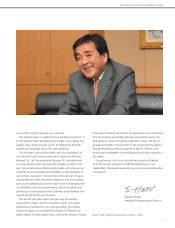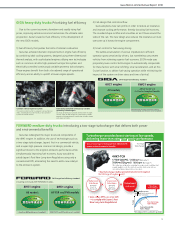Isuzu 2010 Annual Report Download - page 19
Download and view the complete annual report
Please find page 19 of the 2010 Isuzu annual report below. You can navigate through the pages in the report by either clicking on the pages listed below, or by using the keyword search tool below to find specific information within the annual report.
17
Isuzu Motors Limited Annual Report 2010
4. Dependence on General Motors Corporation and other
major customers
The Isuzu Group supplies vehicle components to General
Motors Corporation (Detroit, MI) and its affiliates as well as to
other vehicle manufacturers. Sales to these customers are affected
by fluctuations in production and sales at these customer compa-
nies and other factors over which the Isuzu Group has no control,
and therefore they could have a negative impact on the Group’s
performance and financial position.
5. Suppliers and other providers of parts, materials, etc.
The Isuzu Group sources the raw materials, components, and
products required for production from outside suppliers. Should
supply-demand conditions significantly exceed suppliers’ capac-
ity, it is possible that Isuzu may be unable to source these items
in sufficient volume. Shortages or delays in the supply of parts
and other materials could have a negative impact on the Group’s
performance and financial position. It is also possible that a tight
supply-demand situation would result in price increases for raw
materials and other supplies, which could also have a negative
impact on the Group’s performance and financial position by trig-
gering rising costs if the increases cannot be absorbed internally,
for example through improved productivity, or passed on to sales
prices.
6. Product defects
At its plants both inside and outside Japan, the Isuzu Group
manufacturers products according to the strictest globally accept-
ed quality control standards. However, in the unusual event of a
large-scale recall or product liability award (the Group is covered
by product liability insurance, but in the case of costs exceeding
insurance coverage), there could be a negative impact on the
Group’s performance and financial position.
7. Joint ventures
The Isuzu Group engages in business in some countries in the
form of joint ventures due to legal and other requirements in
those countries. Changes in the management policy, operating
environment, etc., of these joint ventures could affect their per-
formance, which could in turn produce a negative impact on the
Group’s performance and financial position.
8. Disasters, power outages, and other interruptions
The Isuzu Group regularly conducts disaster prevention inspec-
tions and facilities examinations at all sites in order to minimize
the potential of a negative impact due to an interruption in the
manufacturing process. However, the Group may not be able to
completely eliminate or minimize the impact that would arise from
a disaster, power outage, or other interruption during the
manufacturing process.
Additionally, a new H1N1 virus or other infectious disease pan-
demic could pose significant obstacles to the Group’s production
and sales activities.
9. Securities investments
The Isuzu Group invests in securities to produce, sell, and
distribute its products as well as to build and maintain good
relationships with its business partners. For marketable securi-
ties, a downturn in share prices could have a negative impact on
the Group’s performance and financial position. Isuzu provides
management guidance and advice to companies—including those
in which it has invested through non-marketable securities—that
can have a strong influence on its own business results. However,
if the financial condition of the companies in which Isuzu has
invested were to deteriorate due to factors such as a worsening
business environment, this could have a negative impact on the
Group’s performance and financial position.
10. Retirement obligations and deferred tax assets
The figures recorded for “retirement obligations” and “deferred
tax assets” are estimates that reflect the judgment of manage-
ment. Due to the uncertain nature of estimates, in some cases
actual results may vary from initial estimates, and this could have a
negative impact on the Group’s performance and financial
position.
11. Potential risks associated with international activities
and foreign ventures
The Isuzu Group conducts some of its manufacturing and mar-
keting activities outside of Japan, in the U.S. and in developing
and emerging markets in Asia. The following risks are inherent in
such overseas business development and could have a negative
impact on the Group’s performance and financial position:
•
Unfavorable changes in the political or business climate
•
Difficulties in recruiting and retaining personnel
•
Inadequate technological infrastructure could have a negative
impact on the Group’s manufacturing activities or its customers’
support of its products and services
•
Potential negative tax consequences
•
Social unrest stemming from terrorism, war, or other factors
12. Limits on intellectual property protection
The Isuzu Group has accumulated technology and expertise
that differentiate it from its rivals; however, in certain regions
due to legal restrictions the Group is unable to fully protect, or
can only partly protect, its proprietary technology and expertise
through intellectual property rights. As a result, the Group may
be unable to effectively prevent third parties from using its
intellectual property to make similar products.
13. Legal requirements
The Isuzu Group is subject to various government regulations
in the countries in which it does business, such as business and
investment approvals, statutes related to national security, tariffs,
and other import and export regulations. The Group is also sub-
ject to legal requirements concerning areas such as commerce,
antitrust, patents, consumer rights, taxation, foreign exchange,
environment conservation, recycling, and safety. Unexpected
changes in these regulations could have a negative impact on the
Group’s performance and financial position. Exhaust emissions
regulations are generally being tightened amid growing environ-
mental awareness. Since substantial investment is required to
comply with these regulations, failure to generate sufficient sales
to recover this investment could have a negative impact on the
Group’s performance and financial position.
























